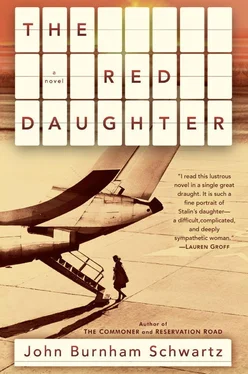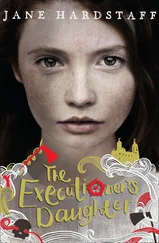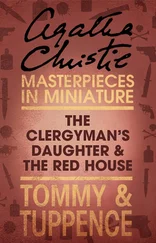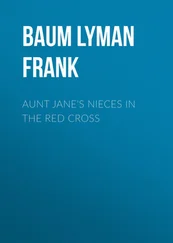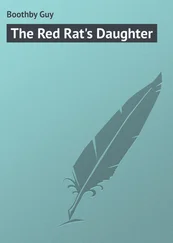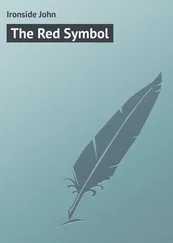John Schwartz - The Red Daughter
Здесь есть возможность читать онлайн «John Schwartz - The Red Daughter» весь текст электронной книги совершенно бесплатно (целиком полную версию без сокращений). В некоторых случаях можно слушать аудио, скачать через торрент в формате fb2 и присутствует краткое содержание. Город: New York, Год выпуска: 2019, ISBN: 2019, Издательство: Random House, Жанр: Историческая проза, на английском языке. Описание произведения, (предисловие) а так же отзывы посетителей доступны на портале библиотеки ЛибКат.
- Название:The Red Daughter
- Автор:
- Издательство:Random House
- Жанр:
- Год:2019
- Город:New York
- ISBN:978-1-40006-846-3
- Рейтинг книги:4 / 5. Голосов: 1
-
Избранное:Добавить в избранное
- Отзывы:
-
Ваша оценка:
- 80
- 1
- 2
- 3
- 4
- 5
The Red Daughter: краткое содержание, описание и аннотация
Предлагаем к чтению аннотацию, описание, краткое содержание или предисловие (зависит от того, что написал сам автор книги «The Red Daughter»). Если вы не нашли необходимую информацию о книге — напишите в комментариях, мы постараемся отыскать её.
The Red Daughter — читать онлайн бесплатно полную книгу (весь текст) целиком
Ниже представлен текст книги, разбитый по страницам. Система сохранения места последней прочитанной страницы, позволяет с удобством читать онлайн бесплатно книгу «The Red Daughter», без необходимости каждый раз заново искать на чём Вы остановились. Поставьте закладку, и сможете в любой момент перейти на страницу, на которой закончили чтение.
Интервал:
Закладка:
The lobby of the Hotel Sovietsky was constructed entirely of white marble. Even the potted trees were albino. Svetlana had seen an American TV program once about a man dressed as God—well, it must have been a joke because he was playing the Almighty wearing a white jumpsuit and white disco shoes and lightly tinted aviator sunglasses, jumping around and lip-synching to a song called “You Make Me Feel Like Dancing”—but not even that Disco Jehovah had been as sad and shocking to her as the sight, in the grand white lobby of the Sovietsky, of this bald, pouchy, drained-looking, thirty-nine-year-old man staring at her from across the room.
The last time she’d seen Josef was eighteen years ago in the departures lounge at Sheremetyevo. Slim as a poet then, and still with the possibility of a smile behind his eyes. Calm enough in his heart because he’d believed he would be seeing his mother again in two weeks. She would spread Brajesh Singh’s ashes, visit with his people, and then return to her own children, bringing them presents from India.
Josef was not waving now. Katya had never got her hand-dyed sari, nor he his miraculously preserved black mamba. It had all been a ruse of the most obscene cruelty. Added to her elder son’s frozen aspect in the grand lobby, his mother observed with a shiver of her own, was his visible mortification that whatever she should be after all these years of abandonment, however she should appear on this day of all days, it must not be like this. Fifty-eight? How could she be fifty-eight? And foreign? Why wasn’t she dead? No. It was against propriety; a final broken promise.
1984–1985: MOSCOW/TBILISI
19 November 1984
Hotel Sovietsky
Katya’s response to my letter asking if I might see her:
If I call you a traitor to the Motherland, this is not a figure of speech. I mean the words as they were designed.
Understand me clearly: The moment you left the Motherland eighteen years ago, I became an orphan. The Motherland adopted me. I do her bidding now, as a daughter would, if I do anyone’s.
Do not contact me again.
I do not forgive you for what you did. I will never forgive you. And under no circumstances will I allow you to see your granddaughter.
This in its entirety, written in scientifically compacted handwriting on a stained postcard (Siberian postage stamp) showing a mud yurt with a funny bear-shaped weather vane sticking out of its roof. Location: somewhere at the end of the earth.
I try to place the daughter I used to have in this extreme, antihuman landscape, but fail. And fail again. Sound of the oven door groaning. Her sniffles as she cried in my arms the day she accidentally tore the cover of the notebook I’d just bought her at GUM.
Her husband, the former son-in-law I never met, I have been informed by people who know, died the other year of a self-inflicted rifle shot. A fatality officially registered as an accident.
I look now at Josef, my eldest, where he sits on an overstuffed hotel chair with gold-leaf arms, Katya’s postcard on the glass table between us. Only his third visit since our arrival, none of them pleasant. If we were to listen together at this moment, we might overhear Yasha and his government-provided tutor engaging in their Russian language lessons in the other room. But Josef, I can see, could care less about his little brother, whom he has completely ignored since our arrival. Nor does he seem at all occupied with his sister’s categorical rejection of her blood family. Rather, he shifts on his chair and sighs harshly, wishing to signal as yet unspoken grievances on his own account (though many have already been spoken, beginning with outrage over the Greek trinkets, as he dismissed them, that Yasha and I brought him and his family from our stopover in Athens), yes, grievances he has stored up across the years, while preparing me for never-ending acts of maternal recompense to come. In the spiked grating of his sigh I hear the second wife, Lyuda’s ventriloquist efforts. Perhaps Josef does as well, because he picks up the vodka bottle that he charged to the hotel suite without asking, pours himself a drink, and swallows it down. Not his first. It is eleven in the morning. His eyes have a yellowed tint, the skin beneath them waxy and darkened from fatigue and a liver under perpetual assault. By comparison, I am almost a good bet for longevity. A thought that sickens me, because I am his mother, and it was I who stole their youth from these two children and crippled their futures.
23 November 1984
My dear nurse found me crying one day because I’d just finished reading Pushkin’s The Tale of the Dead Princess and the Seven Knights and had loved it so much I could not stand to believe it was over. This was the first true heartbreak I can recall before losing my mother.
Alexandra Andreevna dried my eyes with the hem of her apron. Then she picked up the beautifully illustrated picture book, which in my anguish and disappointment I had thrown on the floor, placed it back in my hands, and said, Now, silly, there’s no reason for tears. Don’t you know that a good book never ends? It just runs out of pages .
You see, my nurse imagined that all the characters in the books she loved were real people who had actually done and experienced all the things she’d read about. The author too, she believed, was a real person posing as a character, someone simply telling a true if perhaps miraculous adventure that had actually happened, a storyteller like the storytellers of old, before there were books or paper or implements to write with, when all we had to be known in the world were our voices and our memories.
Yesterday, I went to see my beloved nurse’s grave in Novodevichy Cemetery, where, after her death at the age of seventy in 1956, I had her buried beside my mother.
I brought Yasha, irritable and oppressed by the hours of Russian study with the tutor who he complains is so much stricter than the Quakers, and by the harrying persistence of the reporters who’d pursued us from hotel to cemetery and were now spying on us through their Soviet cameras at a distance. From our special cordoned-off section of the graveyard the snow had been cleared, leaving a damp, freezing chessboard of white and brown, on which we were the only foreign pieces. Yasha stood off by himself, kicking angrily at a mound of gray ice with the toe of his British hiking boot. He does not like Russia. And it was clear that the two women buried here—the two most important women of my life—were no more real to him than characters in a story, decidedly not for children, that he had not chosen to read himself but rather was forced to listen to by me. He does not possess my nurse’s unshakable rustic faith in the literal verities of the myths that we choose to comfort ourselves with because, without them, we know that we are naked before the cruelties of fate. My son, in other words, is American. Where I am not. And yet, whatever I am, whatever I was, whatever I may have come from, is no longer to be found here, buried in this graveyard under mud and ice.
25 November 1984
This morning, because I cannot seem to get enough of this masochism show the Americans love to call memory lane, I go to see Fyodor V, whom I recall, at least until today’s visit, as an eminent physicist, intellectual, and true friend in the years after my father’s death. There were not many such people, and among them Fyodor stood apart for his human understanding that what I had come from was perhaps not all that I was. Late one night over dinner at my apartment, after the other guests had gone, he took my hand and said, My dear, if you ever choose to write about this history you were born into and must now grow out of, I hope you will do me the honor of writing it to me. That way you can remain as private as you need to, and protect your children, and at the same time you may feel that there is a friend sitting across the table from you, late at night and just like this, listening with compassion.
Читать дальшеИнтервал:
Закладка:
Похожие книги на «The Red Daughter»
Представляем Вашему вниманию похожие книги на «The Red Daughter» списком для выбора. Мы отобрали схожую по названию и смыслу литературу в надежде предоставить читателям больше вариантов отыскать новые, интересные, ещё непрочитанные произведения.
Обсуждение, отзывы о книге «The Red Daughter» и просто собственные мнения читателей. Оставьте ваши комментарии, напишите, что Вы думаете о произведении, его смысле или главных героях. Укажите что конкретно понравилось, а что нет, и почему Вы так считаете.
